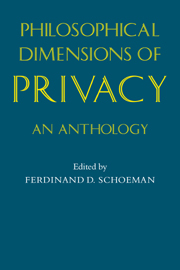Book contents
- Frontmatter
- Contents
- List of contributors
- Preface
- 1 Privacy: philosophical dimensions of the literature
- 2 Social distance and the veil
- 3 The origins of modern claims to privacy
- 4 The right to privacy [the implicit made explicit]
- 5 Privacy [a legal analysis]
- 6 Privacy as an aspect of human dignity: an answer to Dean Prosser
- 7 Privacy [a moral analysis]
- 8 Privacy, freedom, and respect for persons
- 9 Privacy and self-incrimination
- 10 Intimacy and privacy
- 11 The right to privacy
- 12 Why privacy is important
- 13 Privacy, intimacy, and personhood
- 14 Privacy: some arguments and assumptions
- 15 An economic theory of privacy
- 16 Privacy and the limits of law
- 17 Privacy and intimate information
- Selected bibliography
- Index of names
12 - Why privacy is important
Published online by Cambridge University Press: 12 December 2009
- Frontmatter
- Contents
- List of contributors
- Preface
- 1 Privacy: philosophical dimensions of the literature
- 2 Social distance and the veil
- 3 The origins of modern claims to privacy
- 4 The right to privacy [the implicit made explicit]
- 5 Privacy [a legal analysis]
- 6 Privacy as an aspect of human dignity: an answer to Dean Prosser
- 7 Privacy [a moral analysis]
- 8 Privacy, freedom, and respect for persons
- 9 Privacy and self-incrimination
- 10 Intimacy and privacy
- 11 The right to privacy
- 12 Why privacy is important
- 13 Privacy, intimacy, and personhood
- 14 Privacy: some arguments and assumptions
- 15 An economic theory of privacy
- 16 Privacy and the limits of law
- 17 Privacy and intimate information
- Selected bibliography
- Index of names
Summary
According to Thomas Scanlon, the first element of a theory of privacy should be “a characterization of the special interest we have in being able to be free from certain kinds of intrusions.” Since I agree that is the right place to begin, I shall begin there. Then I shall comment briefly on Judith Jarvis Thomson's proposals.
Why, exactly, is privacy important to us? There is no one simple answer to this question, since people have a number of interests that may be harmed by invasions of their privacy.
(a) Privacy is sometimes necessary to protect people's interests in competitive situations. For example, it obviously would be a disadvantage to Bobby Fischer if he could not analyze the adjourned position in a chess game in private, without his opponent learning his results.
(b) In other cases someone may want to keep some aspect of his life or behavior private simply because it would be embarrassing for other people to know about it. There is a splendid example of this in John Barth's novel End of the Road. The narrator of the story, Jake Horner, is with Joe Morgan's wife, Rennie, and they are approaching the Morgan house where Joe is at home alone:
“Want to eavesdrop?” I whispered impulsively to Rennie. “Come on, it's great! See the animals in their natural habitat.”
Rennie looked shocked. “What for?”
“You mean you never spy on people when they're alone?
- Type
- Chapter
- Information
- Philosophical Dimensions of PrivacyAn Anthology, pp. 290 - 299Publisher: Cambridge University PressPrint publication year: 1984
- 30
- Cited by



